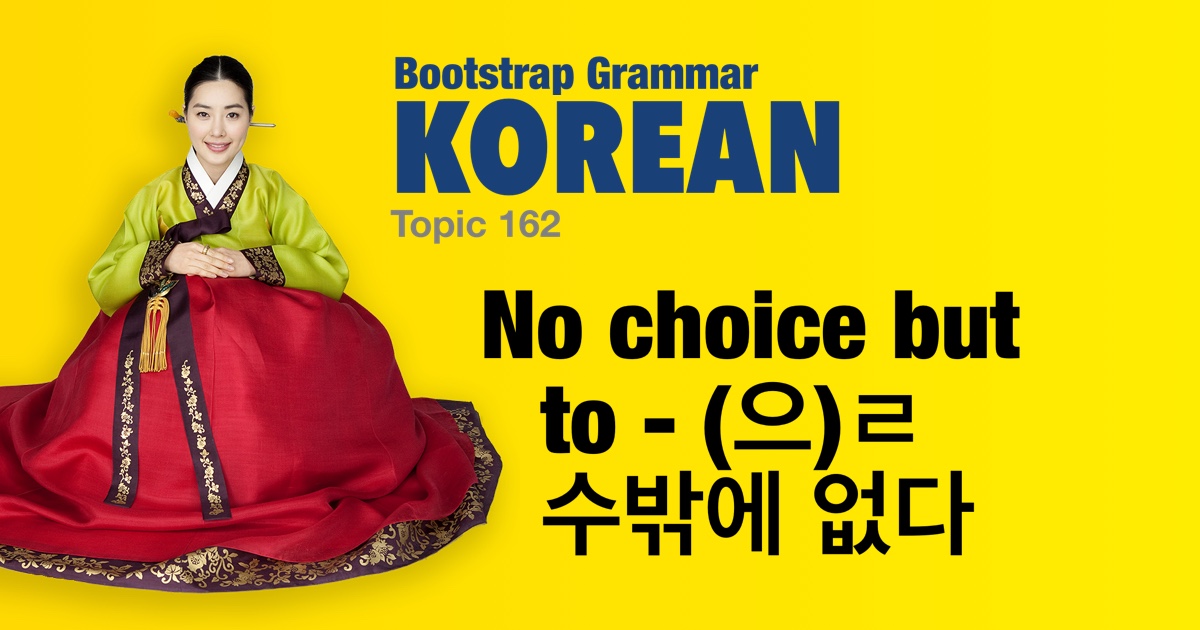Korean grammar - No choice but to - (으)ㄹ 수밖에 없다 |
|||
|
|||
Pattern: Verb stem + (으)ㄹ 수밖에 없다 The Verb ending (으)ㄹ 수밖에 없다 is used to express a lack of alternative choices or options. There is a sense of resignation - of making do with that for which there is no alternative. So the English is 'to have no choice but to' do something or 'to make do'. Other equivalents include 'can't help but', or even 'to have to'. |
| Examples: | |
|
하지만 나는 그때 웃을 수밖에 없었어요.
But then (I) couldn't help but laugh. |
|
|
시간이 얼마 없어서 빵으로 때울 수밖에 없네요.
(I) don't have much time, so (I) have no choice but to make do with bread.
|
|
|
다른 마땅한 게 없어서 이 보기 싫은 모자를 살 수밖에 없었어요.
(I) had no other choice but to buy this ugly hat. |
|
|
약속 시각에 늦지 않으려면 택시를 탈 수밖에 없어요.
In order not to be late for an appointment, I have no choice but to take a taxi. |
|
|
해달라는 대로 해줄 수밖에 없어요.
(I) can only do what you ask me to do.
|
|
|
겨울이니까 추울 수밖에 없다.
It's winter, so of course, it's cold.
|
|
|
이 음식은 맛있지만, 지금은 배가 불러서 남길 수밖에 없네요.
This food is good, but now I am full and I have no choice but to leave it. |
|
|
지금은 내가 그것을 비밀로 할 수밖에 없어요.
(I) have no choice but to keep it secret now. |
|
|
지금은 코로나 때문에 집에 머물 수밖에 없어요.
Right now, (I) have no choice but to stay at home because of Covid-19. |
|
|
이 숙제를 포기할 수밖에 없어요.
(I) have no choice but to give up (trying to do) this homework.
|
|
|
더러워서 화장실을 싹 청소할 수밖에 없어요.
Because (it) is so dirty, (I) have no choice but to completely clean the bathroom.
|
|
|
내일도 눈이 올 거라서 다시 한번 경기를 취소할 수밖에 없어요.
Because it will snow tomorrow, (we) have no choice but to cancel the match once again.
|
|
|
늦게 자니까 늦게 일어날 수밖에 없다.
(I) went to sleep late, so (I) have to wake up late.
|
|
|
이 영화는 보고 낄낄거릴 수밖에 없다.
(I) can't help but giggle while watching this movie.
|
|
|
중국어를 처음 배울 때는 어려울 수밖에 없다.
Learning Korean for the first time can definitely be difficult.
|
|
|
음식은 매우 맵지만 배가 고파서 먹을 수밖에 없다.
The food is extremely spicy, but (I) have no choice but to eat it because (I) am hungry.
|
|
|
돈을 모으려면 아껴 쓸 수밖에 없다.
To save money, (one) has no choice but to stretch it out (conserve it).
|
|
|
현금이 없어서 카드로 계산할 수밖에 없었다.
(I) didn't have cash, so (I) had no choice but to pay by card.
|
|
|
그 식당은 음식이 맛있고 서비스도 친절해서 손님이 많을 수밖에 없다.
Because the food is delicious and the service is friendly, this restaurant cannot but have a lot of customers.
|
|
|
빨래를 못 해서 어제 입은 옷을 또 입을 수밖에 없어요.
(I) couldn’t do laundry, so (I) have no choice but to wear the clothes (I) wore yesterday.
|
|
|
시간이 없어서 택시를 탈 수밖에 없어요.
(I) don't have time, so (I) have no choice but to take a taxi. |
|
|
다리를 다쳐서 등산 약속을 취소할 수밖에 없어요.
(I) injured (my) leg and had no choice but to cancel (my) hiking appointment.
|
|
 |
|




